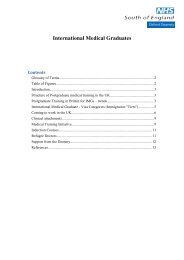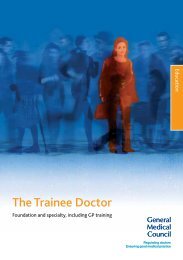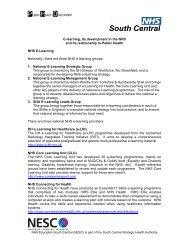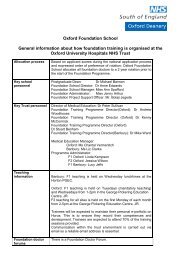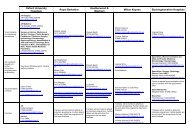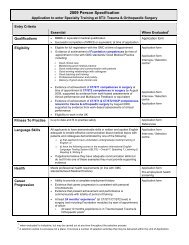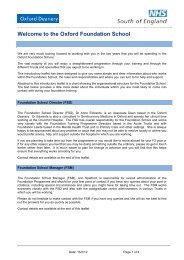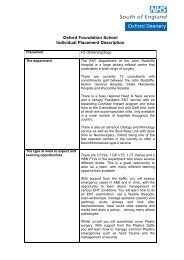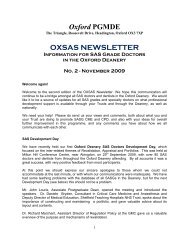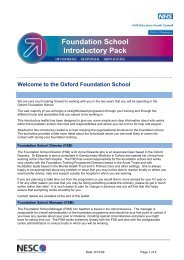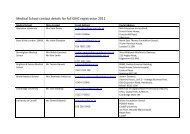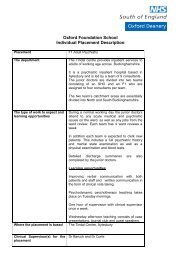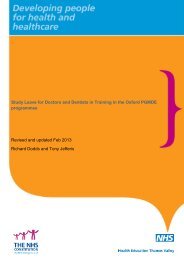Clinical Simulation News ( Autumn 2012).pdf - Oxford Deanery
Clinical Simulation News ( Autumn 2012).pdf - Oxford Deanery
Clinical Simulation News ( Autumn 2012).pdf - Oxford Deanery
- No tags were found...
Create successful ePaper yourself
Turn your PDF publications into a flip-book with our unique Google optimized e-Paper software.
<strong>Clinical</strong> <strong>Simulation</strong> <strong>News</strong> | <strong>Autumn</strong> <strong>2012</strong>Carl’s ColumnBy Carl Read, SimCentre Manager atUniversity Hospital SouthamptonMaking SimMan bubble andswingWe run a course here at SouthamptonGeneral Hospital called WessexOneLung and the team from Bristolwho wrote the course came up with asimple way of making SimMan operatea chest drain bottle in a realistic way.We pulled the lung fitting off his rightmain bronchus and attached a lengthof silicone tubing from an old suctionpump that is brought out from his torsoat the abdomen section. By doubleclamping this pipe, we could hold avolume of fake blood ready for whenthe chest drain is ‘inserted’ under thedrapes. The chest drain bottle thenbubbles and swings and the fake blooddrains down from the chest drain in ahighly satisfactory way.Welcome to...Lisa Morgan,<strong>Simulation</strong> Trainer,Royal Bournemouthand ChristchurchNHS FoundationTrustI have very recently been appointed asthe <strong>Simulation</strong> Lead within the RoyalBournemouth and Christchurchhospital. This is a brand new role forthe organisation so it is a very excitingposition to be in. My role is to develop afaculty of simulation educators, todevelop simulation educationprogrammes and to embed its use ineducation to meet local objectives. Thisis to be multi-disciplinary as the role islead by professional development andmedical education.I have a clinical background inemergency nursing and have beenworking in simulation for three and ahalf years in another acute trust. I wasalso one of the NHS South Central<strong>Clinical</strong> <strong>Simulation</strong> and Patient SafetyFellows of 2011.The Royal Bournemouth Hospital istaking simulation to new levels: it hasjust purchased a state of the artophthalmology simulator, of whichthere is only one other in the region.Featured Fellow: Prad ShanmugasundaramBy Prad Shanmugasundaram, <strong>Clinical</strong> <strong>Simulation</strong> Fellow and Anaesthetic and ICM SpecialtyRegistrar, Royal Berkshire NHS Foundation TrustSupervisor: Dr Debbie Rosenorn-Lanng, Consultant Anaesthetist,Director of <strong>Simulation</strong> and HQI, Royal Berkshire NHS Foundation TrustI was appointed as a <strong>Clinical</strong> <strong>Simulation</strong> Fellow to map theanaesthetic curriculum to simulation. This project has developed intoseveral streams:1. Development of a generic scenario templateAn early priority has been to standardise the design of simulationscenarios produced across the region. There is currentlyconsiderable variation in scenario design which can cause difficultiesfor faculty delivering training sessions at several sites, and may alsolead to barriers to sharing simulation resources.To reduce this variability, a generic scenario template has been produced for the use of all<strong>Clinical</strong> <strong>Simulation</strong> Fellows. Use of this template ensures a comprehensive approach andconsistently high quality of scenarios produced on behalf of the SHA.The generic template has been adopted to design scenarios for healthcare professionalsfrom a variety of disciplines including: nurses of various specialties (Paediatric and neonatal,Critical care and Outreach, Emergency department); Advanced theatre practitioners andtrainee ODPs; Paramedics; Air ambulance crew; Doctors of various specialties (Anaesthesiaand intensive care, Paediatrics and neonatology, Surgery, General medicine, Obstetrics,Emergency medicine, Acute medicine).2. Mapping the anaesthetic curriculum to simulationThis process has been facilitated by the Royal College of Anaesthetists <strong>Simulation</strong> SteeringGroup who have been undertaking a curriculum mapping exercise and have been willing togenerously share their work.3. Producing and trialling a library of curriculum-mapped scenarios for anaesthetictrainingTo date, over 30 distinct scenarios have been produced and delivered to anaesthetic,intensive care and Acute Care Common Stem (ACCS) trainees, primarily at the RoyalBerkshire Hospital, but also at Wexham Park and Stoke Mandeville Hospitals. Thesescenarios have been mapped to specific modules from the curriculum, including airway,critical incidents, intensive care, novice, obstetrics and paediatrics.An additional patient safety module has been developed. The scenarios in this module havearisen from analysis of the National Patient Safety Agency (NPSA) and other patient safetygroup alerts, Department of Health ‘Never events’ and regular ongoing review of criticalincidents within the trust.4. Embedding scenarios into anaesthetic training and education: LocallyThese scenarios have been embedded into the regular anaesthetic simulation training at theRoyal Berkshire Hospital. Several scenarios from the intensive care module have beenadopted for use during departmental induction training to the intensive care unit at the RoyalBerkshire Hospital. These scenarios have also been delivered to advanced anaesthetictheatre practitioners and ODP trainees locally.5. Embedding scenarios into anaesthetic training and education: RegionallyI have been a key member of the team that has designed and delivered the new Readinessfor the Initial Assessment of Competency Training (RIACT) Course. This is a unique modulartraining course for all of the novice anaesthetic and ACCS trainees in the <strong>Oxford</strong> <strong>Deanery</strong>.The course is comprised of six days spread across the first three months of anaesthetictraining and aims to facilitate the achievement of the Initial Assessment of CompetencyCertificate. This is a key objective required before a trainee can join an on-call rota anddeliver anaesthesia under local or distant supervision. The course includes a mix of lectures,workshops and simulation training. For further information please visit www.riact.org.uk.The developing scenario library has been available to members of the simulation faculty(including the current simulation fellows) at numerous hospitals across the region. Thescenario template has been adopted at Wexham Park Hospital and other centres and hasbeen used to design and deliver training scenarios for anaesthetic and ACCS trainees.Page 4



